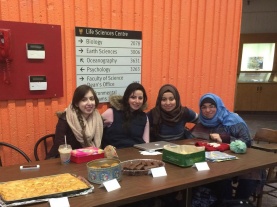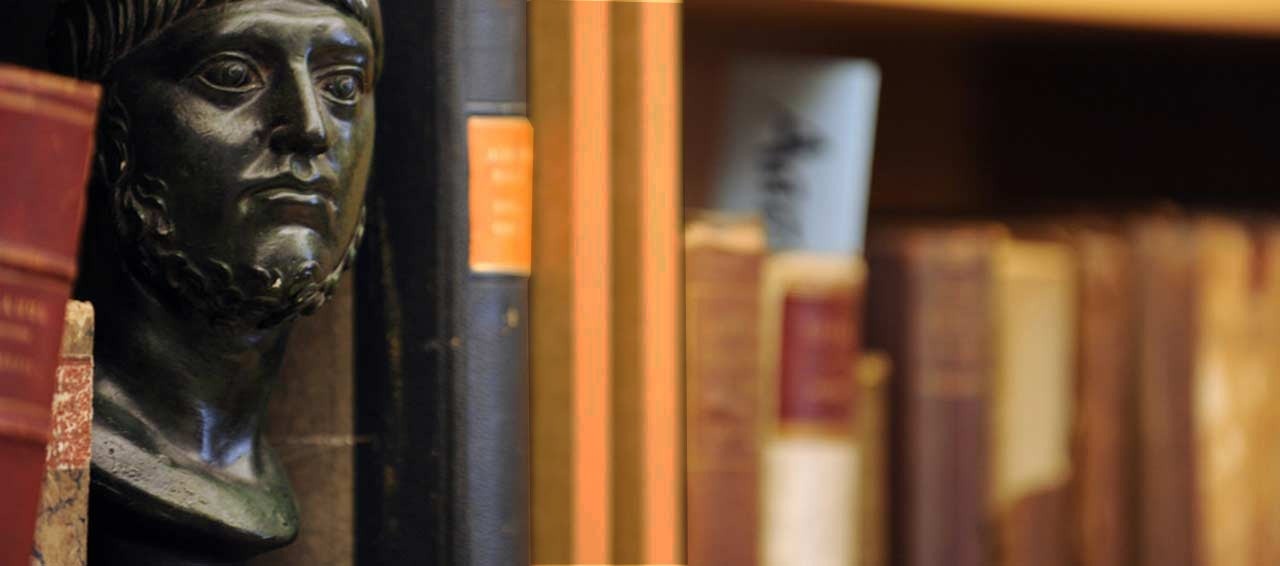Nada Beydoun

Nada (on the right, in blue) with colleagues at the DSSAS Bake Sale
Our students' stories on their journeys with Arabic are all unique and certainly interesting. What Nada's story has in addition is the depth of the spiritual side of a journey she embarked on, in search for authentic, inspiring answers to her quest for self-identification. A Canadian of Lebanese descent, who has lived her entire life in Halifax and studied Standard Arabic at Dal…But let Nada speak! She not only was an excellent student, but her love and enthusiasm for the Arabic language and culture determined her to put much energy in founding the Dal Student Society of Arabic Studies (DSSAS), in Fall 2014 (now with over a hundred members) which is, to a great extent, her legacy. Congratulations, Nada, for all your wonderful achievements! Always stay in touch and update us on your further experience with Arabic…
Dr. Rodica Firanescu
I have graduated with a degree in Microbiology and Immunology, a certificate in Intercultural Communication, and a Minor in Arabic Studies. Out of the three, the Arabic Studies Minor was my most recent addition but arguably the most enthralling.
My background is that of a third culture kid, with my ethnicity being Lebanese Arab, but having been born in the U.S. and raised nearly all my life in Halifax, Canada. I have not yet visited Lebanon, my parents' homeland, nor have I stepped foot in the Middle East. My desire to travel these countries and experience the multitude of dialects and various cultures has grown stronger with my exposure to the Arabic language and culture classes.
While my parents are Arabic speaking, my own fluency in the Lebanese dialect was considered “broken” and I could only very minimally communicate in it. I did have relative knowledge in the reading and writing of the Standard Arabic language as a result of my education in Islamic Quranic lessons. On the contrary, I did not have any knowledge of the grammar, proper sentence structures, nor verbal forms, and even the very basic understanding that the majority of Arabic words derive from three root consonants was not made known to me until I took the Intermediate level course in my undergrad. The Arabic language is an important part of the Arab identity so it was a given that my lack of fluency in the language posed a barrier in my self-identity and in some interactions with family members and Arab acquaintances. I’ve always felt self-conscious of this gap and wanted to improve an essential part of myself by gaining a better knowledge and grasp of the language.
In all honesty, before deciding to go through with the enrollment, I was intimidated as I always saw the Arabic language as a difficult, arduous challenge that was maybe not the right thing for me to commit to and was quite likely not going to go through with it. Upon meeting with Dr. Firanescu for the first time to theoretically discuss my level of placement in the Arabic classes and to discuss my thoughts, it became real right then that this was a way for me to connect with an important aspect of my culture, ancestry and identity.
On top of learning the grammar, vocabulary and verbal structures, Dr. Firanescu would incorporate into her lessons stories that she associated with certain vocabulary, the roots of the vocabulary, and would share with us her experiences with her respectable path of studies and travels to acquire the knowledge and fluency of Modern Standard Arabic with the addition of dialects. I have had my own challenges with the language, as it is indeed rich in every sense and requires much attention, practice, and time. Whenever I would have mental blocks with the language, Dr. Firanescu would immediately find a way for me to see the aspect I was having trouble with differently and help me come to a better understanding with ease. Most importantly, Dr. Firanescu’s immense passion for Lady Arabic was what drew myself, along with classmates who had also agreed, to continue onto the advanced Arabic language course. I’ve never had a “ugh I don’t want to do this” moment, as I have admittedly had with some of my other courses, and would enjoy the evening company of my Arabic assignment with a side of Arabic tea and music and took what was in-front of me as an exciting challenge.
In the 2014-2015 school year, I took part in the initiative of ratifying the ±«Óătv Student Society of Arabic Studies. Taking on the position of President, myself and the four other executives (along with several key members) were able to promote the society and Arab culture at the DSU winter society carnival, host an Arabic desserts bakesale, and hold an Arabic calligraphy workshop, with the society now boasting over 100 members. While I am no longer part of the executive, the society will be in good hands and hopes to host more events whereby a dynamic can be created where people can learn from one another through cultural exchange along with shared linguistics and art forms.
The Arabic language courses have helped me in many ways, such as being able to determine how to formulate my sentences properly and have a better understanding of Arabic words that used to be completely foreign to me. It has also helped me in my English tutoring of an elderly, Arabic-speaking couple, whereby my study of the Modern Standard Arabic has given me the opportunity to know how to properly prepare lesson-plans in a standard format to best get the lessons across. Nonetheless, I still have long way to go with my study of "Lady Arabic" and will continue committing my time to expanding my knowledge of the language and hope to complement these studies and connect with my ancestry by travelling to the Middle East. While the Arabic Studies Program is small, it has a great support system, with Dr. Firanescu always inviting students to arrange a time to go over their work or any struggles, along with fellow classmates willing to help one another out. I wish the best of luck for students who choose to challenge themselves with this intricately rich language and assure that it will prove to be rewarding in many ways.
-Nada
